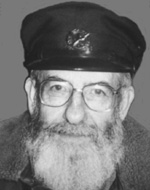Son of Rabbi Moshe and Rivka Axelrod. He was born on 13.3.1929 in the city of Kalimovitz, in Soviet Russia. His father, who was a Lubavitcher Chassid, served as rabbi in the communities of Soraz and Zlobin in Russia, and after immigrating to Israel he served as rabbi in Ramat Gan, where he immigrated to Israel in 1936. At the age of seven, Torah education in Ramat Gan and Bnei Brak, and later at Tiferet Tzion Yeshiva in Bnei Brak and in the high yeshiva “Tomei Temimim” of Chabad Chassidim in Tel Aviv. At the end of his studies, at the beginning of June 1951, Aryeh enlisted in the IDF and served as a religious symbol in the Givati Brigade, and after his release from the IDF in 1954, he married Dinah Roth. The couple settled in Bnei Brak and over the years their three daughters were born. Simultaneously with his concern for the household, Aryeh studied in religious studies and was ordained as a rabbi. In early 1962 he returned to serve in the regular army and was appointed head of the Kashrut Inspection Unit, and in 1968 he was sent by the Chief Military Rabbinate to Argentina to set up an infrastructure for the import of kosher meat to the IDF. In 1972 Aryeh underwent a course for military rabbis and was appointed military chaplain. As head of the Kashrut Department, he was in charge of halakhic supervision of all matters of the IDF’s overall food-supply training and conducted inspections of slaughterhouses, meat factories, bakeries, and various factories. In 1976, he was appointed Chief of the Chief Rabbinate of the IDF and served as Chief of the Food Center, and was appointed Chief Officer for Kashrut and Shabbat Matters in 1980. In 1980 he was promoted to Lieutenant- And was appointed head of the Kashrut branch of the General Staff in the field of food and kitchen inspection. His role, which he defined as “a holy mission,” was fulfilled with devotion and loyalty until his last day. Aryeh used to work every day, from dawn to late hours, in any weather, regardless of the harsh conditions and the obstacles that came his way. In 1991, he received a certificate as a city rabbi. “A rabbi who does everything himself” – was a sentence they used to say about Rabbi Elitzur. Even at the end of his life, he was a worker, a researcher and a self-examiner, without messengers or assistants. He avoided consideration of considerations of honor and prestige, and in his view was only the level of kashrut, which he fought with all his might. He was not ashamed to climb into warehouses or bend under the heavy machines. Modesty and humility were his guiding principle, and despite the hard work he refused to accept anything for himself and was careful not to take anything from the factories he visited, lest the benefit cause any harm to his judgment. All those around him, including factory owners and slaughterhouses whom he visited, appreciated him and were deeply impressed by his energetic work and his great responsibility. Every year, starting in the month of Shevat, he would begin preparations for Pesach, go out to train food factories, find vegetables without worms, and with the sentence in his mouth, “preparations for Pesach begin to find the holiday until next year.” Famous and famous was his loyalty to the system, to the Chief Military Rabbi and to his commanders. He always said humbly: “I just see, I do not decide, I’m reporting and they’ll decide, I’ll convince as much as I can.” Indeed, he was convinced, and in many of the factories, the kashrut regulations were amended and improved. Rabbi Shmuel Dov Rosenberg, Rabbi of the Air Force, wrote of Rabbi Elitzur: “His simplicity, his honesty and his honesty, as” things that come out of the heart “have often penetrated the hearts of those who have been criticized by him. It is very important not to give up time to the Torah, and even on the days when he worked hard, he did not give up learningTorah, early in the morning or late at night. At any time, he continued to study and study in the areas of kashrut and halakhic implications stemming from technological innovations. His wonderful personality radiated in his attitude to all who came into contact with him. “Father and brother,” “spiritual father,” they said about him; The nobility of the soul, the light of the face and the granting of respect for every person to whom Rabbi Elitzur clung, were a great thing. Aryeh was an exemplary family man, bound by deep love for all his family. The perfect “giving” person. From his sickbed he also took care of the family members and apologized for being harassed. Rabbi Aryeh died on 17 September 1996 from an illness and was laid to rest at the Rabbinical Park in the “Segula” civilian cemetery in Petah Tikva. He was sixty-seven when he died. Survived by a woman, three daughters – Chaya Rivka, Leah and Aliza, nine brothers and sisters – Malka, Tzira, Sarah, Chana, Gedalyahu, Nechama, Dvora, Yocheved and Zehava. His family commemorated the dedication of a Torah scroll for his soul to the “Yeshivat Orhot Chaim” synagogue in Bnei Brak.
